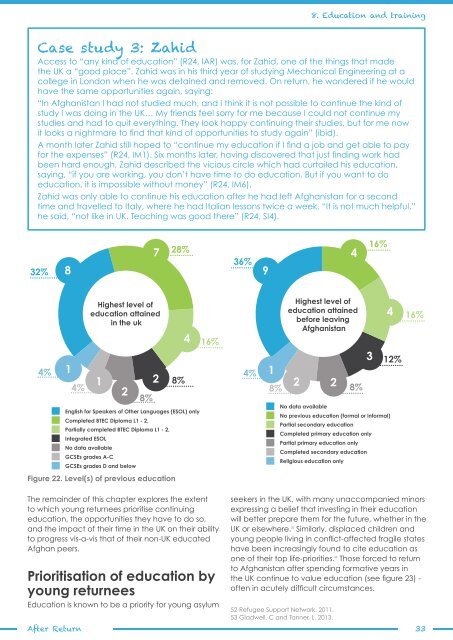After Return
After%20Return_RSN_April%202016
After%20Return_RSN_April%202016
Create successful ePaper yourself
Turn your PDF publications into a flip-book with our unique Google optimized e-Paper software.
8. Education and training<br />
Case study 3: Zahid<br />
Access to “any kind of education” (R24, IAR) was, for Zahid, one of the things that made<br />
the UK a “good place”. Zahid was in his third year of studying Mechanical Engineering at a<br />
college in London when he was detained and removed. On return, he wondered if he would<br />
have the same opportunities again, saying:<br />
“In Afghanistan I had not studied much, and I think it is not possible to continue the kind of<br />
study I was doing in the UK… My friends feel sorry for me because I could not continue my<br />
studies and had to quit everything. They look happy continuing their studies, but for me now<br />
it looks a nightmare to find that kind of opportunities to study again” (ibid).<br />
A month later Zahid still hoped to “continue my education if I find a job and get able to pay<br />
for the expenses” (R24, IM1). Six months later, having discovered that just finding work had<br />
been hard enough, Zahid described the vicious circle which had curtailed his education,<br />
saying, “if you are working, you don’t have time to do education. But if you want to do<br />
education, it is impossible without money” (R24, IM6).<br />
Zahid was only able to continue his education after he had left Afghanistan for a second<br />
time and travelled to Italy, where he had Italian lessons twice a week. “It is not much helpful,”<br />
he said, “not like in UK. Teaching was good there” (R24, SI4).<br />
32%<br />
8<br />
7<br />
28%<br />
36%<br />
9<br />
4<br />
16%<br />
4%<br />
1<br />
4%<br />
Highest level of<br />
education attained<br />
in the uk<br />
1<br />
2<br />
8%<br />
English for Speakers of Other Languages (ESOL) only<br />
Completed BTEC Diploma L1 - 2,<br />
Partially completed BTEC Diploma L1 - 2,<br />
Integrated ESOL<br />
No data available<br />
GCSEs grades A-C<br />
GCSEs grades D and below<br />
2<br />
8%<br />
4<br />
16%<br />
4%<br />
1<br />
8%<br />
Highest level of<br />
education attained<br />
before leaving<br />
Afghanistan<br />
2<br />
2<br />
8%<br />
3<br />
No data available<br />
No previous education (formal or informal)<br />
Partial secondary education<br />
Completed primary education only<br />
Partial primary education only<br />
Completed secondary education<br />
Religious education only<br />
4<br />
12%<br />
16%<br />
Figure 22. Level(s) of previous education<br />
The remainder of this chapter explores the extent<br />
to which young returnees prioritise continuing<br />
education, the opportunities they have to do so,<br />
and the impact of their time in the UK on their ability<br />
to progress vis-a-vis that of their non-UK educated<br />
Afghan peers.<br />
Prioritisation of education by<br />
young returnees<br />
Education is known to be a priority for young asylum<br />
seekers in the UK, with many unaccompanied minors<br />
expressing a belief that investing in their education<br />
will better prepare them for the future, whether in the<br />
UK or elsewhere. 52 Similarly, displaced children and<br />
young people living in conflict-affected fragile states<br />
have been increasingly found to cite education as<br />
one of their top life-priorities. 53 Those forced to return<br />
to Afghanistan after spending formative years in<br />
the UK continue to value education (see figure 23) -<br />
often in acutely difficult circumstances.<br />
52 Refugee Support Network. 2011.<br />
53 Gladwell, C and Tanner, L. 2013.<br />
<strong>After</strong> <strong>Return</strong> 33


